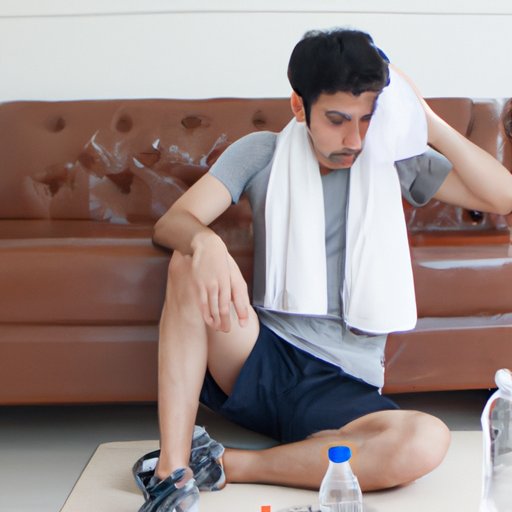Introduction
For many people, exercise is an important part of maintaining their health and well-being. However, it’s not uncommon for some individuals to experience feelings of sickness or unease when working out. This feeling can range from mild discomfort to full-blown nausea and vomiting. In this article, we look at the physical and psychological causes of feeling sick while working out and provide useful tips on how to avoid these feelings.
Analyzing the Physical Causes of Feeling Sick When Exercising
When it comes to feeling sick while working out, there are several possible physical causes. One of the most common is an underlying illness or medical condition. This could be anything from a cold or flu virus, to a more serious chronic condition such as diabetes or heart disease. Other potential causes include dehydration, low blood sugar, and heat exhaustion.
Possible Illnesses
If you’re feeling sick while working out, it’s important to first consider whether you’re suffering from an underlying illness or medical condition. Common illnesses such as colds, flu, or even food poisoning can all cause feelings of nausea and dizziness during exercise. If you have any pre-existing medical conditions, such as diabetes or heart disease, it’s important to talk to your doctor before engaging in strenuous physical activity.
Dehydration and Low Blood Sugar
Dehydration is one of the most common causes of feeling sick while working out. When you become dehydrated, your body is unable to cool itself properly and your heart rate increases, leading to feelings of nausea and dizziness. Low blood sugar, or hypoglycemia, can also lead to similar symptoms. It’s important to ensure you’re adequately hydrated before, during, and after exercise to avoid these issues.

Exploring the Psychological Reasons Behind Feeling Unwell During Workouts
In addition to physical causes, there are also several psychological reasons why some people may feel unwell during workouts. These can include anxiety or stress, lack of motivation, or simply pushing yourself too hard. It’s important to take a step back and assess your emotional state before beginning any kind of exercise.
Anxiety and Stress
Exercise can be a great way to reduce feelings of anxiety and stress. However, it can also have the opposite effect if you’re feeling overwhelmed or overly anxious. If you’re feeling particularly stressed before a workout, it’s important to take a few moments to relax and assess your emotional state. If you’re feeling overwhelmed, it may be best to take a break before continuing.
Lack of Motivation
Another potential psychological cause of feeling unwell during workouts is a lack of motivation. If you’re struggling to find the energy or enthusiasm to exercise, it’s important to take a step back and reassess why you’re doing it in the first place. Taking the time to set realistic goals and rewarding yourself for achieving them can help to motivate you to keep going.
Identifying Strategies to Combat Feeling Unwell While Exercising
There are several strategies you can use to help combat feelings of sickness while exercising. These include drinking plenty of water, eating before and after workouts, listening to your body, setting realistic goals, and taking regular breaks.
Hydrate and Eat Before and After Workouts
Staying hydrated is essential for avoiding feelings of sickness while exercising. Make sure to drink plenty of fluids before, during, and after workouts. It’s also important to eat a balanced meal before and after your workout to help maintain your energy levels and prevent hypoglycemia.
Listen to Your Body and Take Breaks
It’s important to listen to your body and take regular breaks throughout your workout. If you start to feel unwell, take a few minutes to sit down and catch your breath. Taking breaks will help to prevent overexertion, which can lead to feelings of nausea or dizziness.
Set Realistic Goals
It’s important to set realistic goals for yourself when it comes to exercise. Don’t push yourself too hard and try to do too much too soon. Increase your intensity gradually and focus on small, achievable goals. This will help to prevent feelings of disappointment or frustration, which can lead to feelings of sickness.

Understanding How Dehydration and Low Blood Sugar Impact Exercise Performance
Dehydration and low blood sugar can both have a significant impact on your performance while exercising. Dehydration can lead to fatigue, muscle cramps, dizziness, and nausea. Low blood sugar can also cause similar symptoms and can make it difficult to concentrate. It’s important to stay hydrated and eat regularly to avoid these issues.
Dehydration
Dehydration occurs when the body loses more fluids than it takes in. Symptoms of dehydration include fatigue, dizziness, muscle cramps, and nausea. To prevent dehydration, it’s important to drink plenty of fluids before, during, and after exercise. Water is the best choice, but sports drinks can also be helpful for replacing electrolytes lost through sweat.
Low Blood Sugar
Low blood sugar, or hypoglycemia, occurs when the body doesn’t have enough glucose in the bloodstream. Symptoms of low blood sugar include headaches, dizziness, confusion, and nausea. To prevent this, it’s important to eat a balanced meal before and after exercise and to snack on healthy foods during your workout. Foods high in complex carbohydrates and protein are best.

Considering the Benefits of Resting After a Hard Workout
Resting after a hard workout is just as important as the workout itself. Taking a few minutes to recover and reflect on your performance can help to prevent feelings of sickness. It also allows your body to repair and rebuild muscles, which is essential for improving performance. Finally, resting after a workout can also help to reduce stress and anxiety.
Recovery
Taking regular breaks during and after exercise is essential for allowing your body to recover. This helps to prevent feelings of nausea and dizziness, as well as reducing the risk of injury. Taking time to rest also helps your body to repair and rebuild muscles, which is essential for improving performance.
Reflection
Reflecting on your performance after a workout can help to give you a sense of accomplishment and satisfaction. It’s also a great way to identify areas for improvement and set new goals. Taking the time to reflect can also help to reduce stress and anxiety, as well as preventing feelings of sickness.
Conclusion
Feeling sick while working out is a common problem that can be caused by a number of physical and psychological factors. To avoid these feelings, it’s important to stay hydrated and eat regularly, listen to your body, set realistic goals, and take regular breaks. It’s also beneficial to take time to rest and reflect after a hard workout. By following these tips, you can reduce your chances of feeling unwell while exercising.
(Note: Is this article not meeting your expectations? Do you have knowledge or insights to share? Unlock new opportunities and expand your reach by joining our authors team. Click Registration to join us and share your expertise with our readers.)
